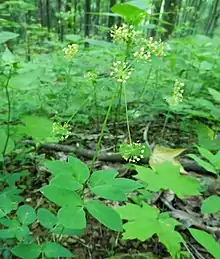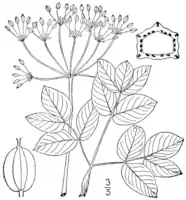Taenidia integerrima
Taenidia integerrima, the yellow pimpernel,[1] is an herbaceous plant in the parsley family. It is native to the eastern North America, where it is widespread.[2] Its natural habitat is rocky prairies and woodlands, often over calcareous substrates.[3][4] It is a perennial.[5]
| Taenidia integerrima | |
|---|---|
 | |
| Scientific classification | |
| Kingdom: | Plantae |
| Clade: | Tracheophytes |
| Clade: | Angiosperms |
| Clade: | Eudicots |
| Clade: | Asterids |
| Order: | Apiales |
| Family: | Apiaceae |
| Genus: | Taenidia |
| Species: | T. integerrima |
| Binomial name | |
| Taenidia integerrima | |
Conservation status in the United States
It is listed as endangered in Connecticut,[6] as historical in Rhode Island, and threatened in Vermont.[7]
Native American ethnobotany
The Menominee take an infusion of root taken for pulmonary troubles, chew the steeped root for 'bronchial affections',[8] and use it as a seasoner for other remedies because of the good smell.[9] The Ojibwe smoke the seeds in a pipe before hunting for good luck.[10]
Gallery
 An illustration showing detail of the reproductive features
An illustration showing detail of the reproductive features
References
- "Taenidia integerrima". Natural Resources Conservation Service PLANTS Database. USDA. Retrieved 26 May 2016.
- "Taenidia integerrima". County-level distribution map from the North American Plant Atlas (NAPA). Biota of North America Program (BONAP). 2014. Retrieved 8 July 2017.
- "Flora of the Southern and Mid-Atlantic States".
- Illinois Wildflowers
- "Plants Profile for Taenidia integerrima (yellow pimpernel )". plants.usda.gov. Retrieved 24 January 2018.
- "Connecticut's Endangered, Threatened and Special Concern Species 2015". State of Connecticut Department of Energy and Environmental Protection Bureau of Natural Resources. Retrieved 19 January 2018. (Note: This list is newer than the one used by plants.usda.gov and is more up-to-date.)
- "Plants Profile for Taenidia integerrima (yellow pimpernel )". plants.usda.gov. Retrieved 24 January 2018.
- Smith, Huron H., 1923, Ethnobotany of the Menomini Indians, Bulletin of the Public Museum of the City of Milwaukee 4:1-174, page 56
- Smith, Huron H., 1928, Ethnobotany of the Meskwaki Indians, Bulletin of the Public Museum of the City of Milwaukee 4:175-326, page 250
- Smith, Huron H., 1932, Ethnobotany of the Ojibwe Indians, Bulletin of the Public Museum of Milwaukee 4:327-525, page 432
This article is issued from Wikipedia. The text is licensed under Creative Commons - Attribution - Sharealike. Additional terms may apply for the media files.